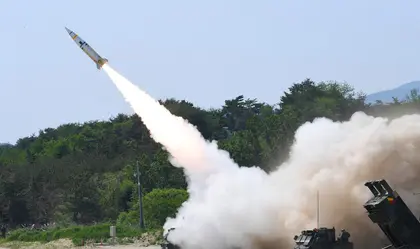The Ukrainian military has carried out its first attack on Russian territory using US-made Atacms missiles, as confirmed by both Moscow and Washington. Kyiv has not provided details on the type or number of missiles used, but said that an ammunitions depot in the Bryansk region had been hit. Europe's press analyses the operation and its potential consequences.
A symbol of Ukrainian resistance
JOIN US ON TELEGRAM
Follow our coverage of the war on the @Kyivpost_official.
Libération (France) sees the missile attacks as symbolising Ukraine's undiminished determination:
“A salvo of six missiles that rained down on Russian soil around 110 kilometres from the Ukrainian border with limited tactical results - a large Russian ammunition depot is said to have been burnt down - but with a spectacular effect. Volodymyr Zelensky took the opportunity to reiterate his country's determination to fight the Russian invasion even on the thousandth day of the war - a symbolic date that no doubt persuaded him not to wait any longer.”
No element of surprise
Maksym Zhorin, a Ukrainian officer, comments in Telegraf:
“The decision to allow Ukraine to attack Russian territory with Western weapons should have come as a surprise to the enemy. But we spend our time discussing it publicly - just as we previously discussed the counter-offensive and a host of other issues that should have been kept secret. Thanks to this, the enemy has always had the opportunity to prepare. It's good that the permission was granted at all. It's bad that it came so late, and with restrictions. It's even worse that it was announced to everyone.”

Russia Claims Capture of Two More East Ukraine Villages
Legitimate self-defence
The Salzburger Nachrichten (Austria) stresses that Ukraine is behaving correctly, in contrast to Russia:
“Ukraine is using its long-range missiles against military targets. And thus in its defence. This is a deployment within the framework reportedly authorised by the US. A military facility is a legitimate target in war - unlike civilian buildings such as the homes, hospitals and schools which are being reduced to rubble by Russian missiles in Ukraine.”
The beginning of the end of US support
LRT columnist Vytautas Bruveris (Lithuania) fears a U-turn after Trump takes office:
“It is telling that the incoming US administration has reacted no less hysterically to the outgoing Washington administration's decision than Moscow or Budapest, for example. It is a further sign that it will probably stop not only this, but all military aid in general. The logic is simple: Kyiv will finally be forced to sit down at the 'negotiating table' without significant conditions and agree to a 'deal' - effectively giving up the territories conquered by Russia and renouncing Nato membership. In return, Russia will stop attacking the rest of Ukraine. ... And if Ukraine doesn't agree - well, that's its and Europe's problem.”
Moscow's usual sabre rattling
Russia will react as it always does, says The Irish Times:
“The Putin regime has responded predictably, and as it has before to every scaling up of US engagement in Ukraine, with dire warnings of the supposed effects of escalation and with threats to react 'appropriately'. In the past, that has included nuclear sabre rattling, though, in practice, has been limited to more missile raids on civilian targets. ... Moscow's fulminations against what it claims is the US's further internationalisation of the conflict ring particularly hollow with its own deployment of 12,000 reinforcements on the battlefield from North Korea. It has already also been using missiles supplied by Pyongyang and Tehran.”
Reprinted from eurotopics. You can find the original here.
You can also highlight the text and press Ctrl + Enter






